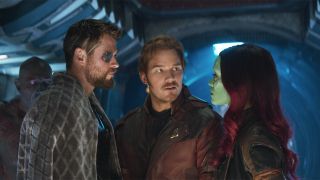Just in case you haven’t seen it yet, Avengers: Infinity War is huge. Well, it was always going to be as the culmination (along with Avengers: Endgame) of the MCU to date and its 18 - now 19 - movies. There are so many characters, so many plot threads, and so many more movies to come that just thinking about how directors the Russo brothers pulled it off gives me a headache. Having said that… they weren’t the ones who had to write it! While directing all those big name stars on set can’t have been easy, writing a decent script which actually makes sense, gives everyone enough screen time, and still does everything it needs to is the first step to blockbuster success and that was down to screenwriting duo Christopher Markus and Stephen McFeely.
Note: There are mild spoilers for Avengers: Infinity War from this point on.
Having worked on many a Marvel movie before, including Thor: The Dark World and Captain America: The Winter Soldier, as well as The Chronicles of Narnia film franchise, Markus and McFeely are no strangers to big budget screenwriting, but surely even they were a little nervous about how they would balance 18 movies worth of backstory in Infinity War and Avengers 4? “We tried not to freak out about it,” laughs McFeely. “And then we gave ourselves permission to give everyone varying sized arcs and participation. So it’s not one movie where 25 people are in a room scene after scene after scene, it’s smaller stories that weave together and come together and break apart so that everyone eventually will feel like they have a good sized role in the movie.”
That also meant ditching anything which wasn’t 100% necessary to the story. “We jettisoned early on any sort of checking in before the story starts of ‘I wonder where Tony lives now?’ or ‘I wonder when Black Widow gets her guns?’” Markus adds. “Anything that didn’t involve the hard Thanos storyline, there was no room for.” Bringing everything back to the big bad wasn’t the chore it sounds like though, as Markus and McFeely really enjoyed writing for the purple giant. “He was sort of delightful because he’s not a maniac, but he’s certainly amoral, he’s smarter than most of the people in rooms he’s in.” McFeely tells me. Markus adds: “Thanos has been a huge amount of fun, because he’s so big and so ambitious and so philosophical that, when you get scenes with Thanos in them, they’re automatically interesting because he’s not going to just glower and do bad guy things, he’s going to be as three-dimensional as we can get him. But he’s also simultaneously trying to do the biggest, craziest thing anyone in any of our movies has ever done, so he’s just a candy store of things.”
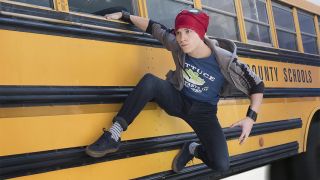
Every new Marvel movie coming until 2022 - from Avengers: Infinity War to Spider-Man: Homecoming 2
Before the pair could have fun writing for Thanos though, they had to come up with a story for him. Where do you even start writing such a vast and packed plot? Well, Marvel Studios has a plan, so all Markus and McFeely had to do was follow that plan, streamline a few things, and write the dialogue, right? Wrong. “There was very little prescription,” Markus tells me. “It was basically: ‘It’ll have Thanos in it and probably the Infinity Stones – come up with some stuff.’” After getting that helpful and detailed brief from Marvel the writers set to work in the midst of making Captain America: Civil War. “In-between setups and basically the back-half of every shooting day, Chris and I would retreat to our office and read comics and start coming up with a sort of memo to give to Marvel saying ‘Here are all the things we could do with this idea.’” McFeely explains. “And then we basically got the powers that be to go through it like a menu and circle things and go ‘I like that, and I like that…’ and then we’d sit there and go ‘Well, you can’t do B if you do A, but you can do C if you do A’,” adds Markus.
How to write a Marvel movie
Once Marvel had picked from Markus and McFeely’s smorgasbord of storyline goodies, they locked themselves in a room for the last four months of 2015 and started writing. “The Russo brothers would come in when they weren’t editing Civil War,” McFeely tells me. “And Kevin [Feige] would come in when he wasn’t doing one of six other things and we slowly marched through outlining two movies by the holidays, and then Chris and I went off and wrote those two movies in the first four or five months of 2016. And then we have just been re-writing those movies for the last year and a half.” If that endless rewriting sounds intense, it was only the beginning. “With all moving parts of it, it was kind of important to have us on set,” McFeely adds. “We’ve been on set for all the movies we’ve done for them - I should say all three Cap movies – so, particularly with the Russo brothers, we do a lot of nipping and tucking and tailoring and adjusting as the dailies come in and the best performances come in. It’s a living beast for that whole year.”
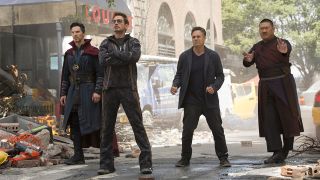
But back to the characters! (There are a lot of characters.) Not everyone was as fun to write for as Thanos, as Markus reveals: “In some ways I would say Black Widow and Steve Rogers [are the hardest to write because]... neither of them are big talkers to begin with, so any time you wind up writing a scene where they sit down and have a chat, it’s going to get cut because it doesn’t feel right. They’re very much on stories, so it’s hard particularly in a movie where you’re not spending all the time with them to find the room to give them a three-dimensional portrait.” If having seen Avengers: Infinity War, you’re thinking that’s true because Cap and Black Widow are barely in it, that’s apparently all going to change in Avengers 4. He starts: “I think we did... over the course of both movies... those two have a… there’s a big… I just want someone to gesture to me and say ‘Shut up!’ [laughs]” Clearly, Markus was getting too close to telling me something about Avengers 4 and had to just stop - I’ve no problem with that, I want to be surprised - but it will at least put some fans’ minds at ease to know that Cap and Black Widow’s Avengers 4 roles will make up for their more minor parts in Infinity War. “Over the course of both movies, everyone gets equal time, put it that way,” Markus finally says. McFeely confirms: “Rest assured, even if your favourite character in any one particular movie didn’t feel like the star, over the course of two movies they’ll have had plenty of screen time and story.”
“It’s a living beast for that whole year.”
Stephen McFeely
The same goes for missing characters. If you were disappointed that Ant-Man didn’t make an appearance in Infinity War, don’t worry, because it sounds like he could play a significant role in the next movie. “On a side note, I love writing for Ant Man,” says McFeely. “He’s always the new guy in all these situations, and he’s always got this wide-eyed thing, and we know that [Paul] Rudd will beat it very often, so whatever line you give him, he’ll pull a little salt and sugar out of it and it’ll be hilarious.” That sounds like Ant-Man alright!
When you’re writing for so many different characters - all with their own agendas, voices, and relationships - the MCU itself can be a great resource in helping writers. “You can refer to them now,” says Markus. “They’re all in the previous movies, so you can study the actor, study them in how the character has behaved and it’s pretty obvious when you’ve gotten it wrong, it just feels wrong. If you’ve given Nebula a five-page emotional theme, then you’re not getting it.” He adds: “One of the nice things, and particularly nice in these movies, is that we get to contrast people. Their voices become clearer when they’re talking to someone who doesn’t talk like them. So, Tony and Cap are always fun to put together because they’re so completely different. Peter Quill and Doctor Strange do not talk the same way, so that’s another.”
Nothing lasts forever
Having spent so long - in some cases years - writing for these characters, it’s hard to imagine Markus and McFeely saying goodbye to them, but it’s unlikely all our favourite superheroes will make it into Marvel’s Phase Four. Captain America is a strong contender to bow out in Avengers 4 after Chris Evans revealed that his contract was up at the end of the Infinity War sequel, and having written all the Cap films, Markus and McFeely couldn’t speak more highly of the character… or the actor who made him famous. “I will say one of the reasons that Captain America has become one of the top couple of important characters in the MCU is because of Evans,” says McFeely. “I like the fact that we’ve been able to slowly bring him forward to a place like in Civil War where he kind of makes a selfish decision, or a self-interested decision - maybe he’s right, maybe he’s wrong - I like that progression that we’ve been able to do.” Markus adds: “And if he does put down the shield, so to speak, it’s been very satisfying over the course of five movies to give him as complete an arc as we’re ever going to have the opportunity to give someone, and we have taken him from a 90-pound kid in 1943 to god-knows-where, and that has been fantastic.” McFeely chimes in: “And that’s a rare privilege for writers, you know?”
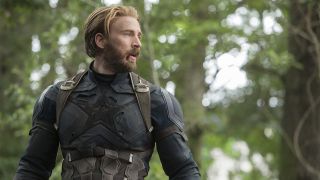
It wasn’t just an abundance of differing characters Markus and McFeely had to contend with when writing Infinity War and Avengers 4 though. There’s also the little matter of the fact that both movies are linked… but not too much. They were originally Parts 1 and 2, but then became just Avengers: Infinity War and its sequel, and now they’re totally different movies? Or are they? “I mean they can stand alone in that they certainly have a beginning, middle, and end,” says Markus. “The first one doesn’t just go to black in the middle of something and tell you to wait a year. It is a complete story. Taken together though, they are one huge epic.” Having now seen Infinity War I’m not sure how much I agree with that statement, but McFeely assures me that Avengers 4 is much more standalone. “I would say the second one is completely independent of the first one.” He says. Markus agrees: “They are very much related, but they are two very different kinds of movies. The second one is not just more of the first one, it’s a different genre, almost.” What genre, Markus wouldn’t tell me (“A romantic comedy!” He jokes), but I’m intrigued to find out.
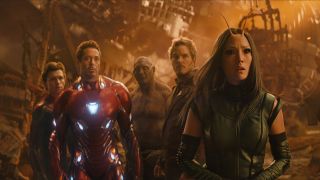
Avengers: Infinity War post-credits scene: What happens, and what it means for the MCU
Another MCU hallmark is how funny the best Marvel movies are, but with a storyline as serious and action-packed as Infinity War, how do you balance the humour we’ve come to know and love from these films with, effectively, the end of the world? “Generally speaking things can start lighter before the stakes become apparent,” explains McFeely. “Before players get taken off the board, before complications happen… So it means that it’s lighter up front and then when you get a joke late, it’s very often a big relief because you’ve probably been in the grips of something serious for a while.” Markus adds: “I also think people make jokes under stress, and so having humour during a serious situation, I find more realistic and more satisfying. If you have people just being hilarious before the story has started, it tends to get annoying.”
The best thing about working on Infinity War and Avengers 4 for McFeely was no doubt the challenge of the project. “It’s like with diving; it’s a really difficult dive to pull off! The degree of difficulty is high,” he tells me. “The logistic dance of telling these two big stories, basically all at the same time, or at least back-to-back, was mind boggling. Like, it is the most complicated movie to produce, I’m pretty sure ever, maybe since Apocalypse Now! [Laughs]” For Markus is was more about finally - finally - getting to a point the MCU had been promising for a long time. “In the MCU, like a lot of times when you’re making a movie, there’s some future thing that, in success, we might get to do this thing and in that thing people will be epic,” Markus adds. “It’s the peak of the storytelling and we were no longer implying the thing might happen in the future – we’re actually doing the thing, and to be able to let loose and take the characters to their absolute furthest point is really fun.”
Confused about the Avengers: Infinity War ending? Let’s talk about the nine questions we need answered in Avengers 4.
